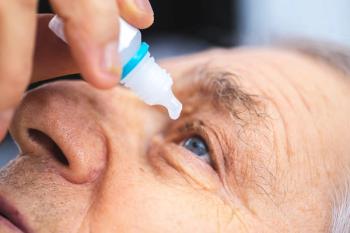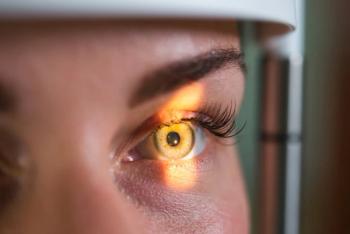
Q&A: Darryl Glover, OD: Cofounder of Defocus Media
grew up in the Triangle area, Raleigh-Durham, NC. I spent time in Orlando, came back to North Carolina for college and for optometry school I went to Pennsylvania School of Optometry in Philadelphia.
Where did you grow up?
I grew up in the Triangle area, Raleigh-Durham, NC. I spent time in Orlando, came back to North Carolina for college and for optometry school I went to Pennsylvania School of Optometry in Philadelphia. I was pretty much up and down the east coast. My father was a project manager for a construction company, and my mother is into leasing luxury apartments in the Triangle area.
Do millennials see optometry differently than their older colleagues?
Absolutely. You can see the profession changing appearance-wise-there are definitely more women in the profession as well as more minorities. When my older colleagues graduated, there was no social media, so its presence has changed the game. It is truly a night-and-day difference from social media to contact lenses to even eyewear design. You’re seeing a little bit of everything change and evolve in a better direction.
Related:
What something your colleagues don’t know about you?
A lot of folks do not know that my mother is from Liberia-I’m part Liberian and American. Another fun fact is that I was born in Detroit, MI. I don’t know anything about it because I was raised in the Triangle area of North Carolina. I’m truly a Southern guy.
Why luxury eyewear sunglasses, and why rely solely on social media to sell them?
I’m a man of luxury-I like nice things, that’s why I work so hard. And I love quality.
Why do private-practice ODs fall off social media marketing, and how can they stay engaged?
They fall off because they don’t have confidence in it. The problem is they do not have great content. Frequently they will repost something they see on some website or social media platform. You need to customize your content-it needs to reflect the office as well as the doctors in that office. With our company Defocus Media, we create customized content for the eyecare professional. We bring in their background, their love, their interests, their niche of optometry as well as local things going on in their community. We also educate eyecare professionals that they must teach their patients about their social media platforms. “Once you get your glasses, we’d love to see a picture of you styling them. Tag us in the picture.” It doesn’t happen overnight; it’s a long process. You have to keep at it. Social media is like a cold start. You have no fans, no followers, nothing. It’s going to take time to build up until you hit that million-dollar practice just like if you get that number of followers who convert to paying patients.
Why is global optometry important?
In Nigeria, optometry is huge simply because there is one optometrist to every 40,000 to 45,000 patients. There is definitely a need here. I learned the game in the States from selling eyewear to being a technician to being a manager to online access to stores, and I’m bringing it to Nigeria to put my own little spin on it but also to propel the profession ways. I’m providing resources with one of my companies ESE Development where I distribute eyewear by independent designers to the big-box names out there, and I’m working with lens companies in this area. I’m in the process of setting up screenings throughout Nigeria to help those who do not have eyewear or have ocular disease. I don’t know how long ago optometrists and ophthalmologists were butting heads with each other, but we are experiencing that here. Given that I’ve seen how optometrists and ophthalmologists can collaborate, especially in North Carolina, I’m bringing that relationship that I’ve experienced with other eyecare professionals to Nigeria and helping to build the profession.
What do you do for downtime?
We love to travel. We already have a trip set up for Cancun in October where I’ve already spoken to my mother and my mother-in-law to watch the baby. I am a big foodie. As long as they continue to make wonderful restaurants, I will continue to give them money and eat. And I’m a big family man.
What’s your guilty pleasure food?
Oh man! You know, I like everything. I like my wife’s cooking, I love the salmon that she makes, grilled chicken, macaroni and cheese. That’s my guilty pleasure. I love fufu and soup. A lot of different ingredients are in this soup; it comes with everything. Chicken, fish, chicken feet, pig’s feet, you name it. Anything you’re afraid of eating is probably in that soup, but it’s amazing.
Do you have any regrets?
No. I don’t regret anything. I love life, I live every day to the fullest, and I’m going to continue to live that way.
Do you see changes in ethnic diversity within eye care?
Absolutely. You can definitely see it at my alma mater, PCO. I think it has the biggest diverse background of students graduating from optometry school, and I see it in eyecare offices. The profession before was mainly Caucasian men, and now you’re seeing folks of African descent and women.
Related:
What’s one thing you would change about optometry as it stands now?
I would change the relationship between traditional optometry and disruptive technology. We need to figure out how to incorporate disruptive technology because it’s not going anywhere, and not all of it is bad. We need to sit down with these companies to figure out how we can work together and use this technology in our practices to make optometry more accessible to folks across the world. For example, EyeNetra-I like its products. They can be used in an optometric office. Say you have a patient come in, and before you go in for the refraction, he has a device in his hand and has already found his prescription by the click of a few buttons. Put him behind the phoropter, see what he found, and make a few tweaks. It will streamline the exam process. A lot of these guys aren’t anti-optometry, trying to shut us down. They are just trying to figure out their lane. If we are open to listening and giving our valid opinions, then we can find a level playing ground. But we should be the guys controlling this disruptive technology and not leaving it in the hands of anyone.
What’s the craziest thing you’ve ever done?
When my wife and a few of our friends went zip-lining in Jamaica. Look, I do not like to do anything adventurous. It was a traditional zip line from one stage to next stage. But when we got to the end, one part was a 100-foot drop; you dropped from the top to the bottom. I was scared the entire time and making the tour guide’s job difficult. So, when it came down to this last thing, I was like, “Dude, I’m not going to do this. “Everyone was screaming at me, “Darryl, you got to do it!” I ended up doing it. If you could see my face, if you could hear my screams, if you could see my legs, you would pee your pants because it was that funny. The guide let everyone else down slow. For the first 10 feet, he let me down slowly, and for the remainder he just let it completely rip. The ride felt like a lifetime when I was going down but in reality was probably only 10 seconds.
Newsletter
Want more insights like this? Subscribe to Optometry Times and get clinical pearls and practice tips delivered straight to your inbox.









































